A nasty odor from rotten food, garbage cans, and smoke isn’t uncommon. But they are easier to tackle and take a minute to eliminate. A few stubborn smells, however, can make you nauseous and put your well-being at risk. One such noxious odor is that of sewerage. But where does it stem from?
Sewerage smell in your home may spring from an overflowing sink, blocked vent pipe, plumbing problem, trapped bacteria in your water heater, improperly installed vent pipe, and more.
You must address the unpleasant-smelling mixture of gases immediately because it can lead to potential health problems. Besides, an underlying issue causing the odor needs fixing, too. So, we’ll dig deeper into the common causes of sewer smells and possible solutions.
What Does a Sewer Smell Like?
The sewer smells like hydrogen sulfide or a distinct rotten egg odor. It is a mixture of inorganic gases, including carbon dioxide, ammonia, nitrogen, hydrogen sulfide, methane, and hydrogen.
The complex mixture of nontoxic and toxic gases can harm your health. So, while the unpleasant odor is one thing, sewerage gas exposure can cause negative health effects.
The gas in low concentrations can irritate the eyes, throat, nose, and respiratory system. Moderate concentrations can lead to more severe respiratory and eye irritation accompanied by nausea, headaches, and dizziness.
Further, exposure to high concentrations of sewage gas can make a person unconscious and may even lead to death.
Why Does Your House Smell Like a Sewer/Sewerage?
A sewerage smell from the kitchen, bathroom, or laundry room indicates a more significant problem and requires immediate action. Methane is one primary gas in sewage and is highly flammable when it accumulates excessively. If left untreated, it can lead to hazardous accidents.
Therefore, the stinky sewer smell is not something you should overlook. However, because tracing the source isn’t a cakewalk, we’ve curated a list of some common causes and how you can fix them.
1. Biofilm Accumulation In Bathroom
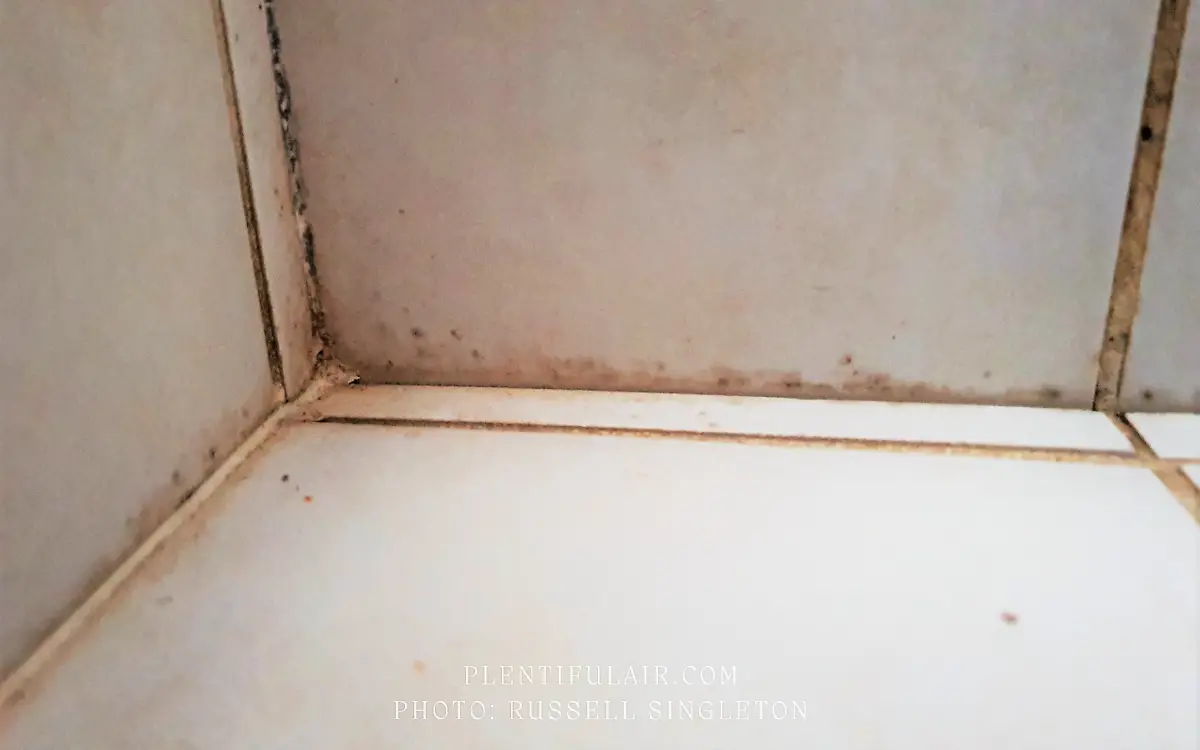
We use different products when showering, from body oils to shampoos and soaps to conditioners. All the products and natural debris, like hair and dead skin cells, go down the drain. While regular maintenance helps clean some residue, the products accumulate in the drain over time, leading to fumes, blockages, and slow drainage.
The residue, also called biofilm, builds up on the vertical pipes below the shower. The accumulation leads to the production of sewage smell from decomposing substances. Further, the bacteria turn into a stubborn substance, sticking to the sides of the pipes. This makes it challenging to wash. So, you need a robust solution to get rid of the sticky compound hiding in the pipes.
Over time, the sewage smell from the bathtub and shower spreads in the bathroom and gradually throughout the property.
Solution
Removing the biofilm is not a hard row to hoe. Therefore, you do not require a plumber to eliminate the problem. Unclogging the drain pipes is all it’ll take to get rid of nasty smells.
To begin with, you must make an all-natural solution using hot water, vinegar, and baking soda. Then, follow the steps below to unblock the debris in the drains.
- Unbolt the shower drain using a screwdriver
- Boil the water and let it cool to 10F before pouring it into the drain
- Pour a cup of white vinegar followed by the water
- Now, add a cup of baking soda
- Let the mixture sit for 2 hours, and pour a gallon of hot water down the drain.
- Finally, use a drain brush to clean the debris and bacteria thoroughly.
A DIY solution offers a straightforward method to clean the shower drain and eradicate sewage odor. However, you may want to contact a professional if the problem persists.
2. Dirty Dishwasher
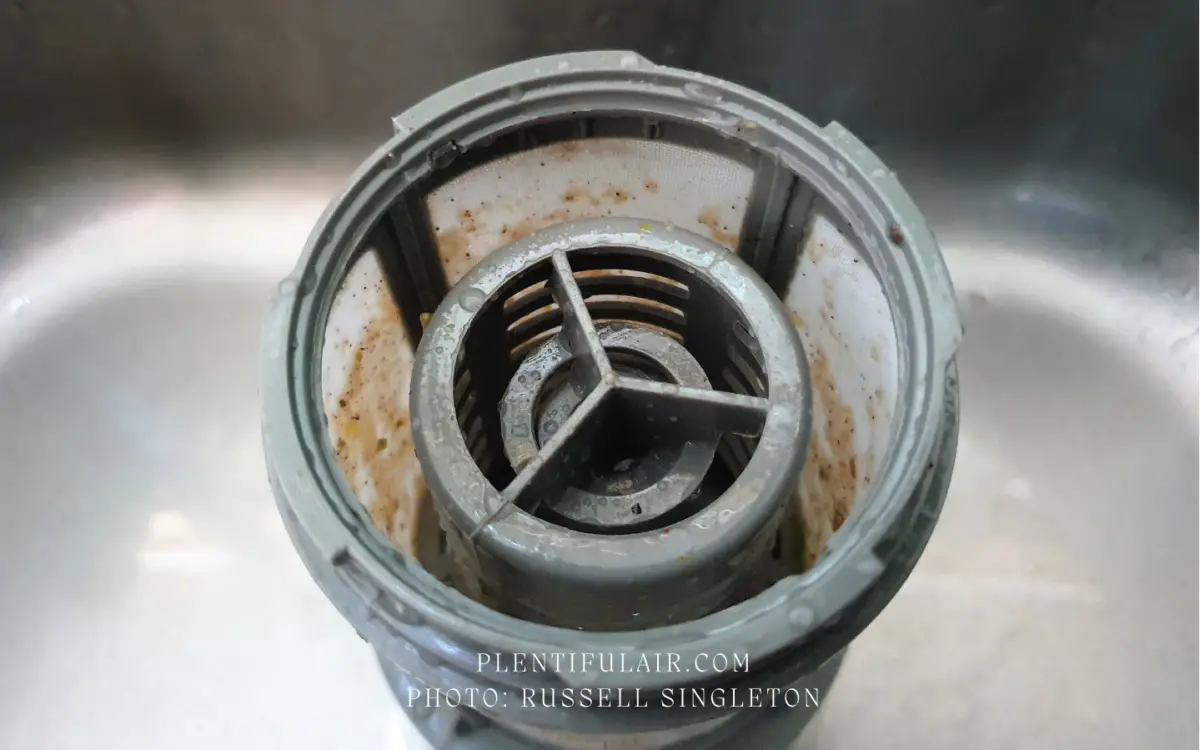
Over a short period of time your dishwasher will start to smell quite badly. Quite often we neglect cleaning the dishwasher as some believe it sort of “cleans itself” – however, this is far from true! Food, oil, grease, and bacteria can all quickly build up in the dishwasher filter and around the door seals making it smell a bit like sewerage.
Solution
Aim to clean your dishwasher including the filter, spray arms, and around and under the door seals approximately every week to fortnight. I recommend using hot water (not boiling) with a small amount of dish soap and a generous amount of vinegar. The vinegar will be highly effective at killing any bacteria and mold without damaging the dishwasher components. Make sure you also use a soft brush on the filter, so you don’t damage the delicate mesh screen.
3. Blocked Vent Pipes
All drainage systems on your property must be adequately vented to keep the sewage smells from seeping into your property. Unfortunately, a clogged vent pipe gives way to sewer gas entering your home.
Solution
You’d need to inspect your home’s vent pipes for clogs. Go to the roof and use a flashlight to look through the vent pipes. If you spot an obstruction like foreign objects, clutter, or pigeon nests, use a long tool to dislodge them.
Alternatively, you can work with the plumber as they remove the debris more cautiously, eliminating the risk of damaging the vent pipe.
4. Improperly Mounted Or Broken Vent Pipe
Broken or improperly installed vent pipes can also cause a persistent sewer smell in your home.
Vent pipes are typically mounted to redirect smells outside your property and regulate the air pressure. However, an improperly fixed pipe can direct odors in the opposite direction: inside your bathroom.
Solution
Fixing the improperly adjusted vent pipe is not a DIY job. Therefore, you’d need to call in a professional plumber for the purpose. A skilled plumber will quickly troubleshoot the issue and re-mount a new vent pipe.
In the event of cracked or broken pipes, plumbers use a smoke machine to fix the problem. When the smoke rises, it finds the leak source, helping plumbers repair the broken pipe.
5. Improperly Mounted P-Trap
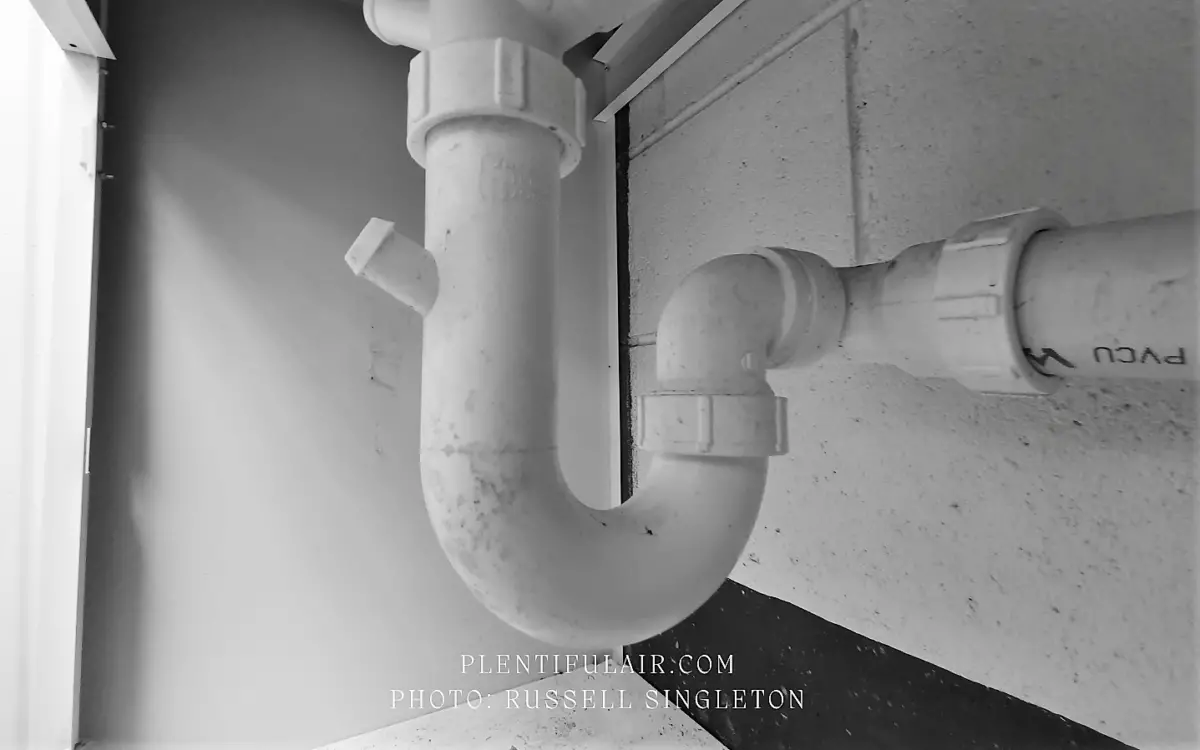
P-traps are typically found in your bathroom and washing machines. Modern washing machines have a flexible drain hose that allows the water to flow into the drain box connecting to the P-trap.
However, because of the hose’s flexibility, it isn’t uncommon for plumbers to install it incorrectly. For instance, they may insert the hose far into the drain box, keeping the P-trap from operating properly. Consequently, it leads to spreading nasty smells throughout your property.
Solution
Pull the hose out of the machine’s drain box and stop when it is approximately 8 inches within the piping. This will allow the P-trap to work correctly, preventing sewer gas leaks.
6. Dry P-Trap
A dry P-trap is another reason your home smells like sewerage. The U-shaped PVC or stainless steel pipes are below your bath or kitchen sink. Their shapes allow them to hold enough water to prevent gases from escaping the line. The functional pipes offer numerous other advantages.
- Keep sewer gas from leaking. P-traps keep nasty smells from spreading around your property. This is a significant advantage as the odors can deteriorate your health.
- Prevent blockages. P-traps prevent the drains from clogging and keep the gases from leaking, which is otherwise common due to blocked drains.
- Catch accidentally fallen belongings. It isn’t uncommon for homeowners to accidentally lose their rings, necklaces, and other delicate belongings into the drain. Restoring the small belongings would have been impossible without P-traps. They catch the tiny items and keep them from flushing down the drain.
If you do not use the shower frequently, the water won’t evaporate from the trap. Nonetheless, if you often use it and still notice the smell, it indicates an underlying problem. For instance, a P-trap leak could be the culprit, keeping it from holding the water.
Solution
Fixing a dry P-trap can be easy and challenging, depending on the severity of the problem.
The P-trap water evaporates when you do not often use your shower. Here, you only need to turn the shower on and allow the water to run for some time. This will refill the P-trap and prevent sewage gas leaks.
If you still smell the sewer, it’s time to pour water down every drain on your property, from the toilet to the sink.
If the smell persists even after taking the troubleshooting steps, it’s time to inspect the P-trap. A worn-out or leaking P-trap could be causing the issue, and you need to contact a professional to replace it.
7. Overflowing Sink
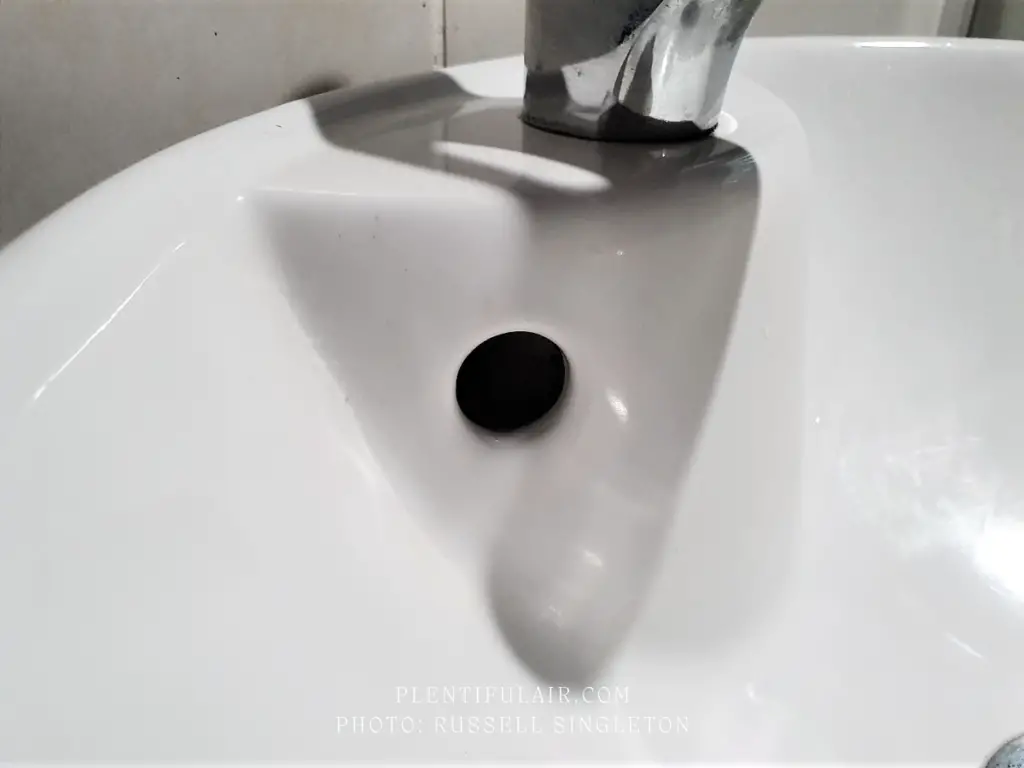
The noxious sewage smell can also stem from the sink. This requires you to check the sink’s overflowing system. Most sinks contain a hole that allows the water to flow out, keeping the sinks from overflowing. However, mold, mildew, and grime buildup are common near the sinks.
This buildup in the overflow can also cause sinks to drain slowly (or not at all). The debris leads to unpleasant sewer odors inside your home.
Solution
- Scrub off the bacteria on the sink’s interior using a small brush
- Create a chlorine bleach and water solution and apply it to the overflowing area
- Use the brush to scrub the lingering debris and eradicate the sewer smell
If the odor doesn’t fade, contact a professional and let them examine your sink.
8. Garbage Disposal
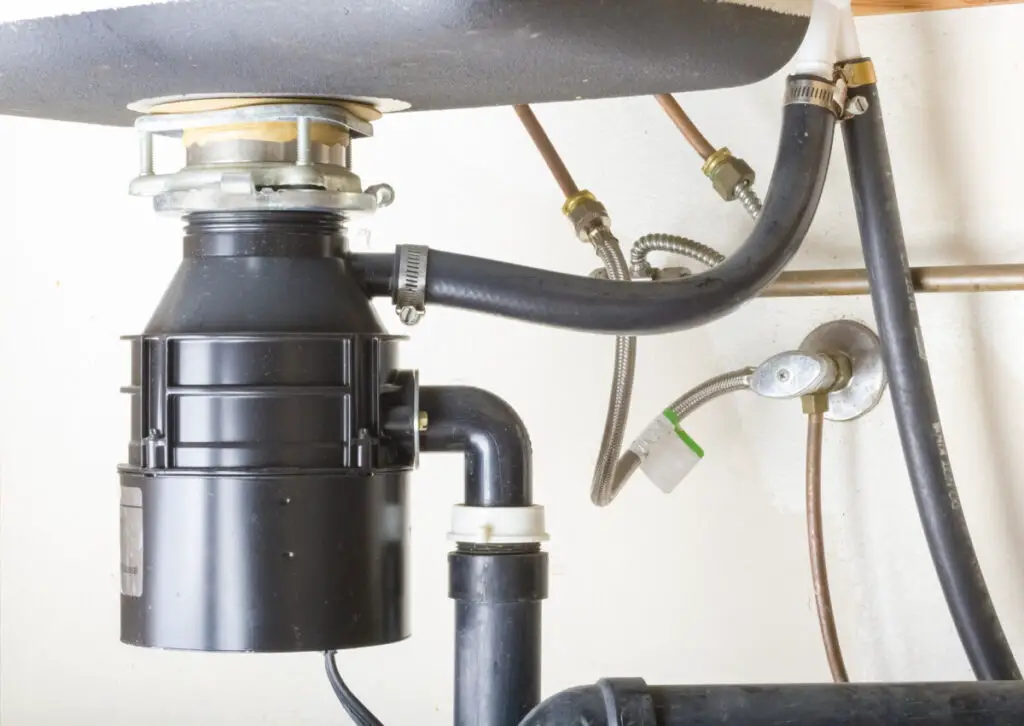
Garbage disposal is a device installed below a kitchen sink to catch (and macerate) solid food waste. The device’s grinding chamber collects the food particles. When you turn the disposal on, the disc and impeller plate spin rapidly, forcing the food against the outer chamber wall.
Even if the disposal performs its function properly, it isn’t uncommon for food waste to get stuck inside the system. This leads to a rotten egg smell in your kitchen. Leaving the garbage disposal unclean can spread odor throughout your home.
Solution
Use ice cubes to clear the disposal food, followed by running cold water for a few seconds. Drop some lemon slices to create a citrusy odor and mask the rotting smell.
9. Drain Obstruction
A blocked washing machine drain pipe can also produce sewer-like smells. Organic matter buildup can clog the drain, creating an unpleasant sewage-like smell. Overlooking its treatment can lead to bigger clogs, more bacteria accumulation, and more nasty odors.
Solution
Fixing the drain clog is pretty easy. Use a long tool to clear the drain blockages and pour warm water to remove the left-over bacteria. Contrarily, contact a professional plumber and let them inspect the washing machine and the drain if you are unsure what to do.
10. Loose or Damaged Toilet Seal
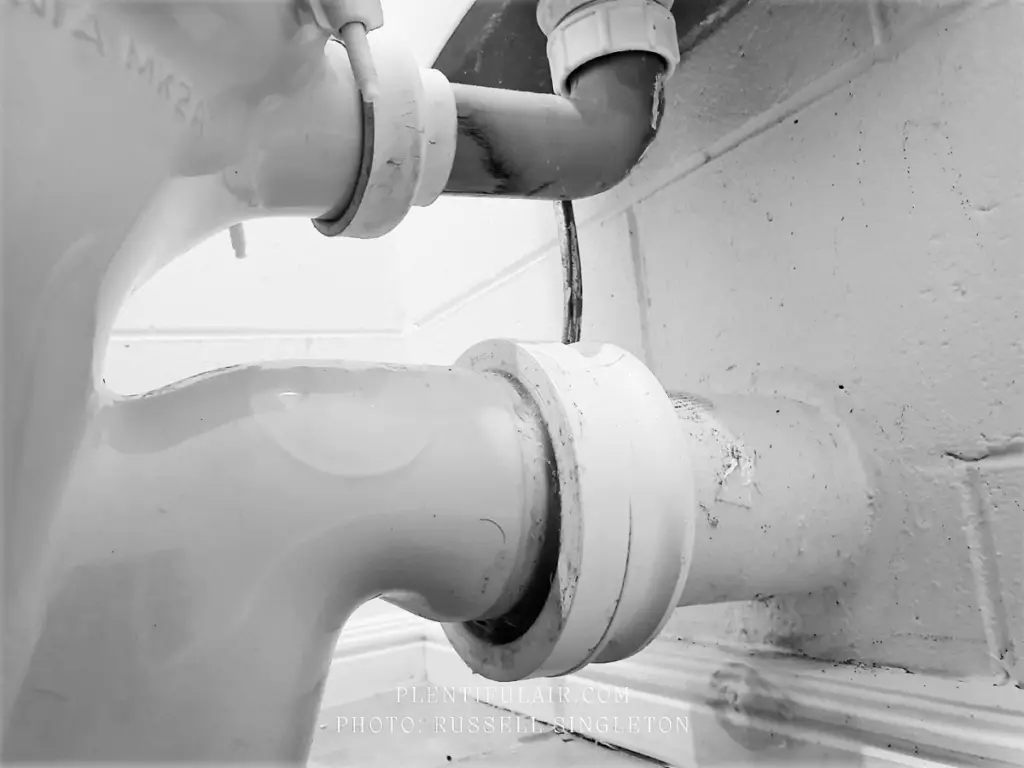
A broken or loose seal can also make your bathroom – and home – smell like sewage. Note that each toilet uses two seals to connect to the drain. Improperly installed or broken seals allow sewer gasses to leak. Fortunately, you can easily spot a broken seal. For instance, a broken seal is a problem if your toilet bowl doesn’t fill up adequately.
Further, a toilet leak can also occur due to a damaged wax or rubber ring. The component seals the toilet drain, preventing the water from leaking. However, a loose toilet bowl can damage the ring, seeping the sewage gas into your bath and, eventually, your home.
Additionally, a cracked or broken toilet can also lead to nasty sulfur odors. A toilet typically breaks around the screws that secure it to the ground. Even a tiny hole can leak gas into your bath.
Solution
Replace any damaged toilet seals – they are relatively inexpensive from your local hardware store.
Applying fresh caulk can also fix the damaged seal problem. You can also apply the caulk around the toilet seal and bolt spaces, fastening it to the floor.
Further, you must replace the toilet ring if the bowl is loose. However, a broken toilet requires extensive repair and professional knowledge to fix. So, you’d need to call a plumbing professional to fix the problem.
11. Bacteria In Your Water Heater
If you only smell sewage gas when using hot water, your water heater may be to blame. When the temperature inside the heater is too low or if you keep it on for extensive periods, bacteria accumulate in the system. While the bacteria aren’t dangerous for your health, it emits a strong sulfur odor, negatively affecting your well-being and the aesthetic quality of your water.
Solution
Consider increasing your water heater’s temperature to kill the bacteria thriving in low temperatures. Ensure you increase the temperature for up to 24 hours to eliminate the bacteria and odor. Further, open the hot water faucets to let the microbes flush out from the pipes.
However, be cautious about using the water after you raise the water heater’s temperature; excessively hot water can lead to burns.
12. Dead Rodents

Did you know approximately one-third of US citizens have had a rodent issue in their homes? So, if none of the above problems resonate with you, it’s time to check for dead rodents around your property. A decaying and rotting mouse in your wall, cabinets, and refrigerator can seep a stinky rotten egg smell into your home.
Solution
The only way to find a dead animal is to thoroughly check your home cabinets, walls, and other enclosed spaces. Wear protective gloves and pick up the decaying animal using a tool. Then, toss the rodent away from your home.
Make sure you seal the spaces in your house to keep animals from entering your property.
Alternatively, you can call an exterminator to tackle the problem.
13. Hydrogen Sulfide Accumulation In Your Well Water
The water source is the culprit if your water consistently smells like sewage, regardless of its temperature. Excessive hydrogen sulfide concentration can cause a strong rotten egg odor around your property.
While the gas is hazardous in large amounts, homeowners easily notice it before it reaches toxic levels. For instance, we can easily detect a 0.5 parts per million (PPM) presence of gas. Hydrogen sulfide levels below 1PPM cause a musty smell, while that above 1PPM produce a rotten egg smell.
Note that a small hydrogen sulfide concentration is a maintenance issue and has nothing to do with health problems. However, leaving the issue untreated can cause it to accumulate beyond normal levels, making the smell unbearable and leading to health issues.
Further, households relying on well water designed into limestone and those with water softeners installed in their homes are more vulnerable to hydrogen sulfide exposure.
Solution
It’s best to conduct a test before proceeding with the solutions. Contact a nearby water testing lab and let them have your water checked for contaminants. If your water tests positive for hydrogen sulfide, it’s time to communicate with a local utility and let them resolve the issue with their professional expertise. They may use the process of aeration or other reliable methods to eliminate the gas from your well water.
14. Mold and Mildew In the Basement
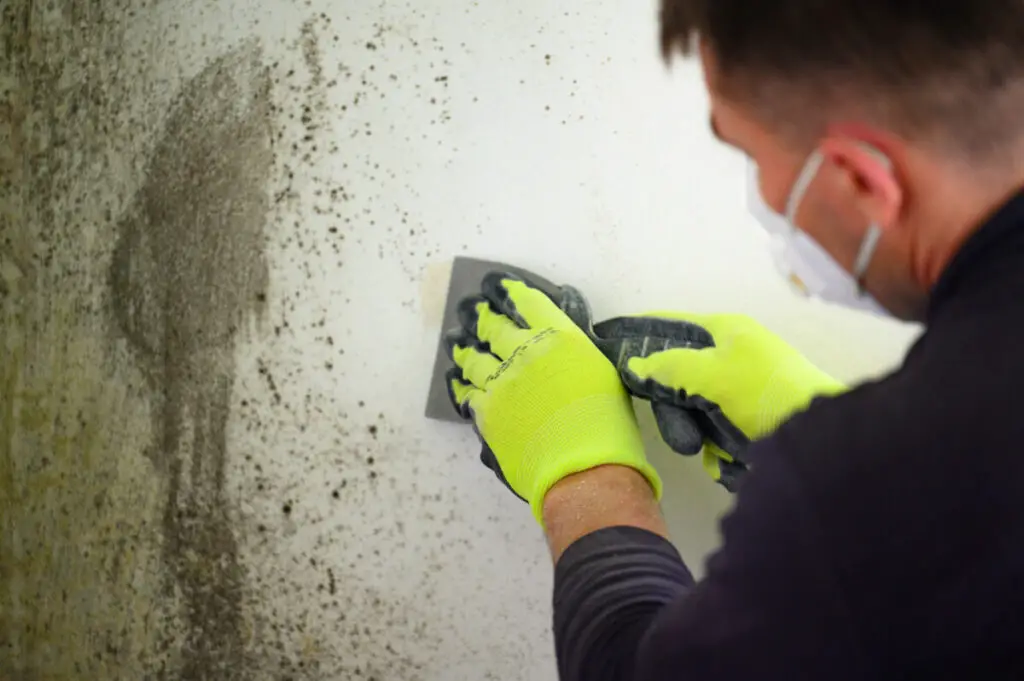
Mold spores naturally exist in the environment. As soon as they find favorable circumstances to thrive, they land on the surface and begin to spread. They naturally idealize moist environments. So, if your home offers one, mold will quickly grow on your property.
While mold can grow in your kitchen and bathroom, a basement is the most common space affected by the notorious mold. Because we use our kitchens and bathrooms regularly and clean them thoroughly, the chances of mold growth in such areas are minimal.
However, the basement is one of the most overlooked spaces in our homes. Besides, it’s situated below ground level, making it vulnerable to moisture. As such, the floating molds find a place to land and thrive.
Many people describe the mold’s smell as similar to sewage/rotten-egg odor. Therefore, if nothing so far is causing the sewer smell in your home, basement mold can be the reason.
Solution
While we cannot stop mold spores from existing in the environment, we can take preventive measures to prevent them from spreading. Initial cleaning and disinfecting are a must. However, it must be followed by appropriate ventilation and moisture reduction to eliminate the mold and the odor permanently.
Add baking soda and vinegar to a spray bottle and apply the mixture onto the spaces affected by mold. Leave the solution overnight and scrub it the next day. If the walls are excessively damaged, you may want to re-paint them.
Further, consider placing floor fans and dehumidifiers to balance moisture levels in your basement. Besides, keep the basement doors open for adequate ventilation and mold reduction.
Why Does Sewer Smell Come and Go?
A sewer smell typically comes and goes due to clogged drains. The smell is mild when the water flushes down the drain but becomes more noticeable when the drain remains unused.
Examine the drain pipes to spot what’s causing an obstruction. Use a drain remover tool to get rid of objects inside the pipe. Finally, pour warm water to eliminate bacteria residing inside the drain walls.
How Do I Get Rid of a Sewage Smell From My House?
The best way to eliminate the sewage smell is to spot the root cause and eradicate it. Alternatively, you can properly ventilate your home and use air purifiers to remove nasty odors.
A modern air purifier effectively eliminates particulates floating in the air. Not only does it filtrate your indoor air, but it also eradicates unpleasant smells. So, anyone dealing with stubborn sewer odors can benefit from the device.
Besides, proper ventilation is crucial to clear the air and remove toxic smells. Consider opening multiple windows and doors of your home regularly. Further, install exhaust fans in every room to boost the air quality and eliminate stale odor.
Why Does My House Smell Like Sewage After Rain?
The air becomes excessively heavy after the rain, keeping methane gases from releasing through the vent. The trapped methane gas stays closer to the ground, producing a foul odor similar to hydrogen sulfide.
While you cannot stop the rain from falling, you can prevent the smell from spreading in your home. Make sure you ventilate your home regularly and install an air purification system to eliminate odors, leaving your air fresh and healthy.
Proper ventilation is not only crucial to eliminate nasty smells, but it is also essential for your general well-being. Poor ventilation leads to polluted air that may cause fatigue, headaches, poor sleep, concentration issues, and breathing difficulties.
So while getting rid of sewer gas smell may be your prime focus, ventilating your home is a must for healthy indoors.
Can Sewer Gas Come Up Through the Toilet?
Sewerage gas smell can come through the toilet. A broken seal, loose toilet, or a damaged wax ring can seep sewer gas from the toilet.
The only way to remove the smell is to fasten the toilet firmly to the ground. Secondly, you must seal the cracked or broken seal to prevent the gas from escaping into your bathroom. Further, a damaged wax ring might require replacements. So, make sure you replace them immediately and prevent the gas from wreaking havoc on your health.
Why Does My House Smell Like Sewage When the Wind Blows?
A gust of wind may carry the sewer odors from the vent pipe around your property. So, your home has an existing sewer problem resulting in the smell. However, the smell becomes more noticeable when the wind blows through your home from the pipes.
